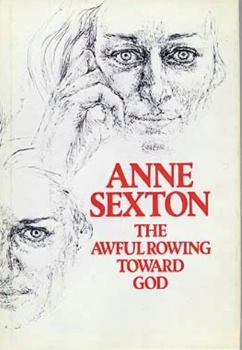The Awful Rowing Toward God
Select Format
Select Condition 
Book Overview
From Wikipedia: Sexton's eighth collection of poetry is entitled The Awful Rowing Toward God. The title came from her meeting with a Roman Catholic priest who, although unwilling to administer last... This description may be from another edition of this product.
Format:Hardcover
Language:English
ISBN:0395203651
ISBN13:9780395203651
Release Date:January 1975
Publisher:Houghton Mifflin
Length:85 Pages
Weight:0.41 lbs.
Related Subjects
PoetryCustomer Reviews
2 ratings
Suffocating anguish and bursts of joy
Published by Thriftbooks.com User , 16 years ago
Anne Sexton's final battles with her personal demons are documented here and it does not make for easy reading. The book opens with the poem Rowing and ends with The Rowing Endeth. In between are extraordinarily powerful poems about life, death, despair, the suicidal impulsive and mercifully about love too. Referring to herself as Ms Dog, the author very honestly examines her psyche in poems like The Civil War, The Room Of My Life and The Witch's Life, a poem that continues a theme established by Her Kind in the first volume To Bedlam and Part Way Back and continued through The Black Art in All My Pretty Ones. A poem like Courage overflows with hurt but has a transcendent quality too and the same duality or conflict becomes very clear in the poem After Auschwitz, where she declares: "Man ... / .../ is not a temple/but an outhouse", proceeding to curse mankind, before concluding with: "I say these things aloud./ I beg the Lord not to hear." The Poet Of Ignorance is painful to read as the arresting image of an indestructible crab gripping the poet's heart becomes a metaphor for mental pain. This oppressive image is reiterated in The Dead Heart, where the tongue did the killing, a theme more delicately investigated in the next poem, Words. The following one, The Sickness Unto Death, must be one of the bleakest poems in the English language in its seemingly casual wrestling with evil and utter despair. The line "My body became a side of mutton/and despair roamed the slaughterhouse" perhaps best encapsulates the unrelenting torment. Mercifully, poems like Welcome Morning - a description of a burst of domestic joy - and The Big Heart - where the "fury of love" for friends and family rushes into her heart, show the other side of Sexton's intensity of feeling. The Awful Rowing Toward God was the last book to be arranged by the author herself and is not recommended for the fragile reader. It chronicles a particularly agonizing search for meaning. But perhaps because of the intensity, some of the musical rhythm of her work from especially the two aforementioned books is missing here. There is still the conversational style, but it would appear that the large crab gripping Sexton's heart was squeezing very hard here, suffocating all but the most unquenchable outbursts of joy like Welcome Morning.
Suffocating anguish and bursts of joy
Published by Thriftbooks.com User , 21 years ago
Anne Sexton's final battles with her personal demons are documented here and it does not make for easy reading. The book opens with the poem Rowing and ends with The Rowing Endeth and inbetween are extraordinarily powerful poems about life, death, despair, the suicidal impulsive and mercifully about love too. Referring to herself as Ms Dog, the author very honestly examines her psyche in poems like The Civil War, The Room Of My Life and The Witch's Life, a poem that continues a theme established by Her Kind in the first volume To Bedlam And Part Way Back and continued through The Black Art in All My Pretty Ones. A poem like Courage overflows with hurt but has a transcendent quality too and the same duality or conflict becomes very clear in the poem After Auschwitz, where she declares: "Man ... / .../ is not a temple/but an outhouse", proceeding to curse mankind, before concluding with: "I say these things aloud./ I beg the Lord not to hear." The Poet Of Ignorance is painful to read as the arresting image of an indestructible crab gripping the poet's heart becomes a metaphor for mental pain. This oppressive image is reiterated in The Dead Heart, where the tongue did the killing, a theme more delicately investigated in the next poem, Words. The following one, The Sickness Unto Death, must be one of the bleakest poems in the English language in its seemingly casual wrestling with evil and utter despair. The line "My body became a side of mutton/and despair roamed the slaughterhouse" perhaps best encapsulates the unrelenting torment. Mercifully, poems like Welcome Morning - a description of a burst of domestic joy - and The Big Heart - where the "fury of love" for friends and family rushes into her heart, show the other side of Sexton's intensity of feeling. The Awful Rowing Toward God was the last book to be arranged by the author herself and is not recommended for the fragile reader. It reflects the agonizing search for meaning that is so universal to the individual consciousness. But perhaps because of the intensity, some of the musical rhythm of her work from especially the two aforementioned books is missing here. There is still the conversational style, but it would appear that the large crab gripping Sexton's heart was squeezing very hard here, suffocating all but the most unquenchable outbursts of joy like Welcome Morning.






